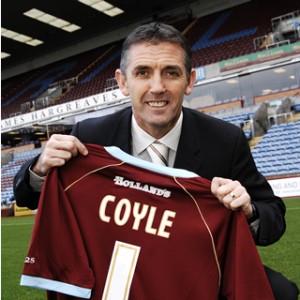|
Swiftly though it may have passed, much has happened in his year in Lancashire. There have been three rough phases to the year, with the first a brief honeymoon period in which the team played positive, vibrant football with success away from home but without reward at Turf Moor.
The second phase spanned the beginning of this season and the remainder of last, from January through to the beginning of September. There were good performances to enjoy, but there was defensive chaos aplenty, and Coyle's pass and move mantra appeared to translate in practice into deliberate, static passing lacking the movement necessary to carry a concerted threat.
And then there has been the final phase, in which things have clicked into place for the Scot and his team. The tempo and cohesion which were troublingly absent in those middle months has returned, gradually complimented by slick passing, relentless running and a joyously inventive streak.
To his great credit, Coyle has remained unfailingly positive throughout - even when it has seemed out of step with events on the field.
He has also stuck adamantly to his principles, even if he has at times been forced to adapt them to ensure their effectiveness. And over the course of the year, the essence of his management philosophy has become clear.
Broadly, managers can be classified in one of two groups. There are those who believe in empowering their players, providing a framework but ultimately trusting players to take responsibility, back their instincts and play the game as they see it unfold in front of them; and there are micro-managers who prefer to programme the movements of their players to ensure they carry out detailed tactical instructions.
Owen Coyle, like Arsene Wenger and Alex Ferguson but unlike the likes of David Moyes, Rafael Benitez or Jose Mourinho, belongs firmly in the former category. He wants his team to play with freedom and spontaneity, and he wants it do so on the front foot, pressing high up the pitch and taking the game to the opposition with or without the ball.
The best examples of his philosophy in action thus far have come in the two high profile cup-ties he has overseen against Arsenal and Chelsea, and it will no doubt be demonstrated further when Arsenal return to town in eight days time. Many managers would legitimately opt for a policy of structured containment against such illustrious opponents, but Coyle has sent his team out containing the same offensive players as he would employ for the visit of a lowly Championship outfit, with the same encouragement to try and score goals. On both occasions, his players have responded impressively to that trust.
In fallow periods in which players lack confidence, teams set up in this manner will be prone to appearing chaotic in defence and stilted in attack, as players made hesitant by lack of belief abdicate the responsibility handed to them. But the reverse is also true: when on song and playing with verve, these are the sides which produce the sort of creative, entertaining football which all supporters wish to see.
This Burnley side have such champagne football in them, but they have not yet hit the loftiest peaks. That is the next step for both manager and team. And beyond that is a further challenge: to ensure that when such doubts do slip in, the manager does not allow them to linger. The best of his type are experts infusing their charges with the belief; without it, their philosophy cannot succeed.
Whether Coyle is capable of doing the same to maintain the success of his men remains to be seen. But he has answered emphatically most of the questions posed of him so far, and has proved himself a fast learner, too.
His use of substitutes was at first underwhelming, but in recent months he has proved adept in the art of changing personnel to alter the course of the game. At the beginning of this season, he attempted to impose too sophisticated a style too quickly; a pragmatic re-evaluation swiftly and sensibly ensued. And the loose enthusiasm of his early interviews has evolved into an articulate, positive but distinctly guarded approach to media questioning.
Indeed, it is worth pondering where Burnley might be had Coyle not been so ambitious in his deployment of Eagles, Blake and Elliott behind Paterson in a diminutive front line at the outset of this season and had he not betrayed his naivety in constructing a patently inadequate pre-season campaign. Without the slow start to the season which resulted from those errors, Burnley could well be challenging Wolves and Birmingham from a position of parity.
It is worth sounding a note of caution here, mind. Two seasons ago, before Steve Cotterill's regime began to unravel, his Burnley side went into December in fourth place, three points shy of an automatic promotion place having accumulated an impressive 34 points from 20 games and having averaged practically a goal and a half a game. As Cotterill knows better than most, getting into position is one thing. Sustaining it into the new year is the tricky bit.
Coyle now has a greater depth of resources than Cotterill could ever call upon, and his team plays with a level of sophistication and class unmatched by any recent Burnley side and which suggests a greater staying power. Having demonstrated both his own potential and that of his team, he must now ensure it is realised in the final reckoning come May. We will learn plenty more about Owen Coyle between now and then.

